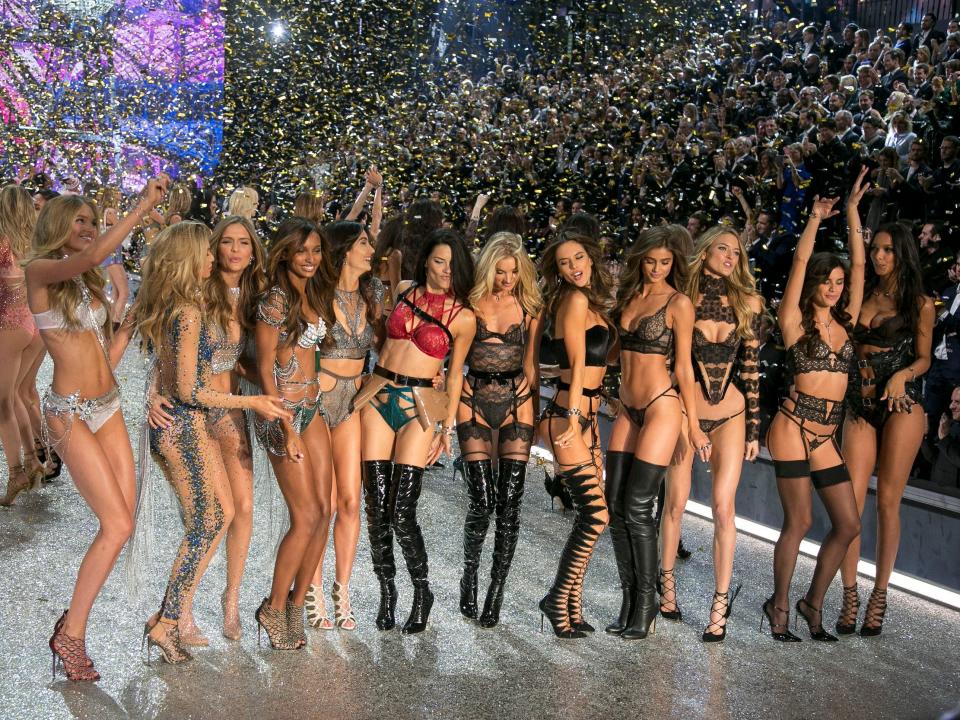Victoria's Secret is resurrecting its famous fashion show in 2023 after a 4-year hiatus and a total brand revamp

Victoria's Secret is bringing back its famous runway show this year after a four-year hiatus.
The lingerie retailer canceled the show in 2019 after criticism, scandal, and lagging sales.
It has since embarked on a turnaround and brand revamp to become more inclusive.
Victoria's Secret is bringing back its famous fashion show after a four-year hiatus and a revamp for the lingerie brand.
The company's chief financial officer, Timothy Johnson, said Thursday that Victoria's Secret plans to spend more on marketing in 2023, both to build brand awareness and to "support the new version of our fashion show, which is to come later this year." Retail Dive was first to spot the news.
Victoria's Secret has previously said the show would eventually return, but never set a date. Johnson, who made the remarks during a quarterly earnings call, didn't provide additional details about the show.
A Victoria's Secret spokesperson told Insider that the company is constantly innovating "in all spheres of the business" and is committed to championing women.
"This will lead us into new spaces like reclaiming one of our best marketing and entertainment properties to date and turning it on its head to reflect who we are today," the spokesperson said. "We're excited to share more later this year."
Victoria's Secret began airing an annual fashion show beginning in 1995. The show featured top models like Tyra Banks, Gisele Bündchen and Gigi Hadid modeling the brand's lingerie and the "Fantasy Bra," which featured real diamonds and gemstones. In more recent years, the show also included musical performances by the likes of Lady Gaga and Selena Gomez.
Viewership topped 9.7 million in 2013, but five years later, it had dipped to just 3.3 million people. That same year, Ed Razek, then the chief marketing officer of Victoria's Secret's former parent company, ignited an uproar when he said in an interview with Vogue that he didn't think the show should include plus-size or transgender models because "the show is a fantasy." Razek, who hand-picked the models who walked in the show, later issued an apology for his comments and eventually resigned.
Razek wasn't the only problem for the brand. Consumer tastes had begun to change, shifting away from the push-up bras and sexpot style defined by Victoria's Secret and toward more comfortable bralettes and sports bras. The retailer was slow to recognize the shift and lost ground to American Eagle's underwear brand, Aerie, and upstart competitors like ThirdLove and Lively. By 2018, Victoria's Secret's market share had dipped to 24% — down from 33% just two years earlier — and customers complained that quality had nosedived as well.
Plus, fans and critics alike had begun to criticize the fashion show and the company's marketing more broadly — which featured only tall, thin, conventionally beautiful models — for being out of touch with typical consumers. Meanwhile, Limited Brands founder Les Wexner had been linked to convicted sex offender Jeffrey Epstein.
The retailer has since been working to overhaul its image. It eliminated the angels in favor of a more diverse and inclusive lineup of models and spokespeople, including soccer star Megan Rapinoe and actor and investor Priyanka Chopra. The changes have helped boost sales.
"We believe we're two years into a five-year journey in the turnaround of our business," CEO Martin Water said during Thursday's earnings call, "and we have a clear roadmap to be the world's leading fashion retailer of intimate apparel."
Read the original article on Business Insider

